If lawmakers stick to their schedule, the Democratic-led House will vote tomorrow on a measure to block Donald Trump's emergency declaration on the U.S./Mexico border. Ahead of the vote, dozens of prominent national security officials have a message for Congress. The Washington Post reported:
A bipartisan group of 58 former senior national security officials will issue a statement Monday saying that "there is no factual basis" for President Trump's proclamation of a national emergency to build a wall on the U.S.-Mexico border.The joint statement, whose signatories include former secretary of state Madeleine Albright and former defense secretary Chuck Hagel, will come a day before the House is expected to vote on a resolution to block Trump's Feb. 15 declaration.The former officials' statement, which will be entered into the Congressional Record, is intended to support lawsuits and other actions challenging the national emergency proclamation and to force the administration to set forth the legal and factual basis for it.
Several of the signatories served in Democratic administrations, but not all. Eliot Cohen, a veteran of the Bush/Cheney State Department, and Thomas Pickering, who served as George H.W. Bush's ambassador to the United Nations, also endorsed the joint statement.
And what a statement it is. "Under no plausible assessment of the evidence is there a national emergency today that entitles the president to tap into funds appropriated for other purposes to build a wall at the southern border," the 58 former officials said.
They're not alone: 23 former Republican members of Congress are urging legislators to "pass a joint resolution terminating" Trump's emergency declaration.
So, what happens now? This is likely to be one of the year's most important congressional debates, so it seems like a good time for a Q&A.
What's the next step?
The House has scheduled a vote for tomorrow on H.J.Res.46, which is a resolution intended to block Trump's policy. It will need a simple majority to pass.
Is it likely to pass?
Yes. As of this morning, it has 225 co-sponsors, which effectively guarantees that it will have little trouble clearing the chamber.
Will House Republicans buck the Trump White House on this?
It's tough to say with certainty. Of the 225 co-sponsors, only one -- Rep. Justin Amash of Michigan -- is a Republican. That said, it's generally assumed there will be at least some additional GOP votes for the measure.
OK, but at that point, won't Mitch McConnell simply ignore the resolution, letting it wither on the vine?
That won't be an option. Under the National Emergencies Act, which is the law Trump is utilizing for this gambit, if one chamber passes a measure to block the White House's effort, the other chamber has to consider it.
It's a Republican-led Senate. Does it have a realistic chance of success?
Maybe. Some Senate Republicans have already indicated they're prepared to vote with Democrats on this, and Sen. Lindsey Graham (R-S.C.), a shameless Trump cheerleader, conceded the other day that some of his GOP colleagues will balk at the White House's position.
Enough to overcome a filibuster?
In this case, the filibuster doesn't apply: it'll be an up-or-down vote in the Senate. To advance, the resolution will need 51 votes, which in practical terms, means four Republicans will have to join the Senate Democratic caucus in voting for it. As of last week, 20 GOP senators had publicly criticized the president's plan.
Sure, but won't they fall back in line when it counts?
Many probably will, but again, proponents don't need all 20 of them to support the measure; they just need four.
Fine. Let's say it passes both chambers. Then what?
Then it'll go to Donald Trump's desk. He promised on Friday that he'd veto it.
And at that point, the fight will be over?
Not quite. In the wake of a presidential veto, Congress would have an opportunity to try to override Trump with two-thirds majorities in both chambers.
That sounds like a long shot.
It is, but even if proponents of the bill fall short, if both the House and Senate were to pass a resolution rejecting the president's policy, that's likely to matter to judges assessing the legality of Trump's dubious scheme.
Is the White House lobbying lawmakers ahead of the votes?
Probably. Trump published a pair of tweets on the subject this morning, both of which suggested he's not altogether confident about the outcome. Meanwhile, Democrats freely admit that they're leaning heavily on their GOP colleagues, pleading with them not to put party over principle.
Indeed, House Intelligence Committee Chairman Adam Schiff (D-Calif.) published a striking op-ed on the subject last week, telling Republican lawmakers, "When the president attacked the independence of the Justice Department by intervening in a case in which he is implicated, you did not speak out. When he attacked the press as the enemy of the people, you again were silent. When he targeted the judiciary, labeling judges and decisions he didn't like as illegitimate, we heard not a word. And now he comes for Congress, the first branch of government, seeking to strip it of its greatest power, that of the purse."
Schiff implored GOP lawmakers to show "courage" when weighing whether to vote for the measure. We'll find out tomorrow how many Republicans have heeded the call.
